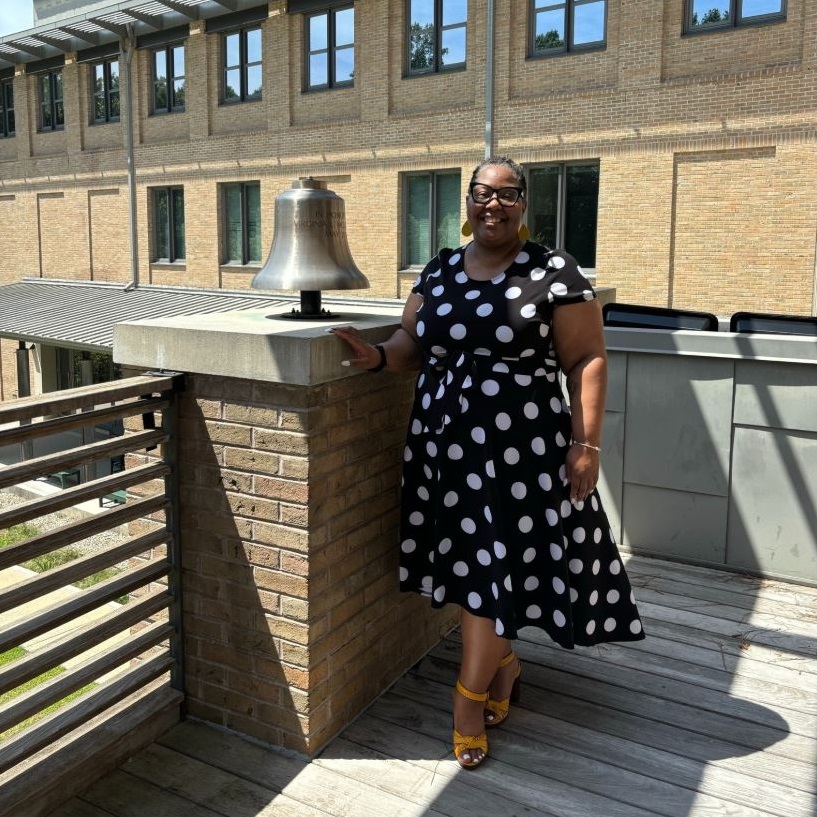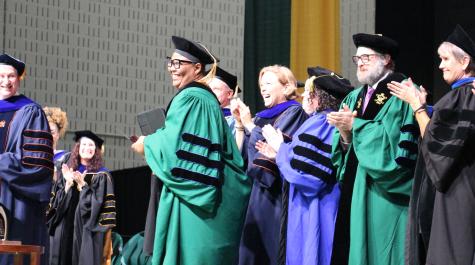Unconventional journey in Counselor Education leads to top honor at graduation
Described by one of her professors as someone who embodies “everything the W&M School of Education strives to be,” Tamika Nicole Jackson Ph.D. ’24 (Counselor Education) is the 2025 recipient of the Margaret, The Lady Thatcher, Award for Scholarship, Character and Service. Her journey to this point began in an unexpected place — on a path shaped not by education or counseling, but by a 15-year career in the finance industry.
“One of the things my father used to say to me growing up was ‘Find a job where you’ll always be needed.’ I thought it made sense to work in the business and finance field because finance professionals are always going to be needed,” said Jackson.
As an undergraduate at Bowie State University in Bowie, Maryland, Jackson studied business administration with a concentration in finance.
“I had every intention of continuing to work in finance, so I went back and got my M.B.A., and it felt like that would be the field I would work in until I retired. It can be very stable and lucrative.”
In addition to working full-time and earning an M.B.A., Jackson was heavily involved in congregational ministry work. Serving as youth director, interim youth pastor, young adult pastor and eventually as an executive pastor, she spent six years training to become ordained as an Elder in the African Methodist Episcopal Zion Church.
Between her professional life and her service to the congregation, she described herself as “essentially bi-vocational” during this time, until she noticed herself starting to dread going to work in the financial sector.
“One day I realized that something needed to change. I love being with people, and I never felt dread when I was going to work at the Church. One of those things was making me feel more joyful and felt more life-giving than the other, and it was the one helping people and serving people.”
Joining the helping professions through counseling seemed like the logical next step. She began researching programs and found an ideal match at Wake Forest University in Winston-Salem, North Carolina, which offers a dual degree in Counseling and Divinity. She left the finance industry and moved to North Carolina to begin a new chapter.
Jackson intended to earn a master’s in counseling and begin clinical work, but a mentor at Wake Forest encouraged her to set her sights higher.
“Dr. [Michelle] Ghoston was one of my first Black woman professors in Counselor Education, and she took me under her wing. I ended up being her graduate assistant, and she kept telling me I really should think about getting a doctorate. I wasn’t expecting to get a Ph.D.” said Jackson.
“It would be little comments here and there: ‘Have you thought about it? We need you in the field.’ That’s the language she would use — because there aren’t enough Black women Counselor Educators in the field, there just aren’t,” Jackson said. “And representation does matter.”
As a doctoral student, Jackson has already made significant contributions to the field. She co-authored multiple peer-reviewed journal articles in top-tier publications such as “Counselor Education and Supervision,” “School Mental Health,” and “Spirituality in Clinical Practice.” Her scholarship, particularly at the intersections of spirituality, cultural identity and trauma, is crucial to the field of counselor education.
“Dr. Jackson’s scholarship reflects a commendable commitment to creating supportive environments for all people … her courageous contribution to the mental health field is critical and groundbreaking,” said Associate Professor of School Psychology Janise Parker.
Surprisingly, despite being a student with a degree in Divinity who is also a twice-ordained minister (her official title is Reverend Dr. Tamika Jackson), Jackson initially planned to keep her religious identity completely separate from her identity as a Counselor Educator. She began the William & Mary counseling program interested in studying multiculturalism, racial identity and possibly anti-blackness, and her initial papers explored these areas. But after receiving feedback from her cohort on a presentation she gave about religion and spirituality, she was persuaded to change her mind.
“When it was over, they looked at me and said ‘we don’t understand why you’re not doing work around spirituality and religion. When you talk about it, you’re excited, you’re face lights up, and you love what you’re talking about,” said Jackson. Ultimately, because of the mutual trust and encouragement of the cohort, she heeded their advice and refocused her research.
“That’s when things really began to open up for me,” she said. One meaningful connection was the opportunity to collaborate with Associate Professor Parker.
“Dr. Parker was one of the first people to invite me onto her research because she also has an interest in spirituality and religion. She reached out and asked if I wanted to write for a publication she was doing, so I certainly credit her with helping me develop my research identity. She played a huge part in that,” said Jackson.
Reflecting on her doctoral journey, two subjects move Jackson almost to tears. The first is the unwavering support of her doctoral cohort. When she arrived at William & Mary, her cohort was the first to make her feel welcome. And the more they got to know each other, the stronger the relationship grew.
“They changed my idea of what cohorts really mean, and a lot of it was because I never felt like I was in competition with them. They were just some of my biggest cheerleaders, and that made a world of difference to me.”
Jackson was also particularly moved by the connections she’s made with her students. Her nominators note that she excelled in a servant-leader role with the Flanagan Counselor Education Clinic.
“As the Student Director of the Flanagan Counselor Education Clinic, she oversaw clinic operations, supervised and mentored master’s-level students, and supported culturally-responsive counseling services.”
Reflecting on her role and her work with students, Jackson shared: “There is so much power in being an educator, and I don’t think we recognize it immediately. What stands out to me most are the students who reach back out after they’ve finished their program. They send cards and letters telling me things I said in class that they remember or hold close to their hearts. Seeing them go out into the world and be phenomenal counselors, and knowing that I had a small part in that, feels like the most beautiful and rewarding thing.”
